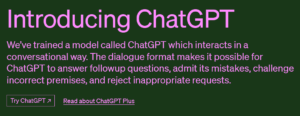List of Best AI Chatbots 2023
- Aivo: a customer service chatbot that responds to customer inquiries with natural language processing. (Link:https://www.aivo.ai/ )
- Amazon Alexa: a voice assistant that can provide users with information, complete tasks, and more. (Link: https://www.amazon.com/alexa-voice-service)
- IBM Watson: an AI-based chatbot built for customer support services. (Link: https://www.ibm.com/products/watson-assistant)
- Microsoft Bot Framework: an open source library of customizable bots for conversational applications. (Link: https://dev.botframework.com/)
- Google Assistant: a voice-enabled conversational assistant. (Link: https://assistant.google.com)
- IPSoft Amelia: an AI-based chatbot that uses a simulated human conversation model to provide customer service. (Link: https://www.ipsoft.com/amelia/)
- Clara: a virtual customer service agent powered by AI. (Link: https://claralabs.com/)
- Nexmo Conversation: a communication platform for building real-time interactions. (Link: https://www.nexmo.com/conversation)
- OpenAI Chat-GPT: a NLM chat bot recently purchased by Microsoft for use on Bing. (Link: https://openai.com/blog/chatgpt)
- MyKAI: an AI-based chatbot for customer service automation. (Link: https://mykai.ai/)
- Ada: a virtual customer service agent designed to alleviate customer service requests. (Link: https://tryada.com/)
- Chatfuel: a platform for creating AI-powered chatbots. (Link: https://chatfuel.com/)
- Replika: an AI-based chatbot that can provide companionship and help its users lead meaningful lives. (Link: https://replika.ai/)
- Haptik: an AI-enabled platform that helps businesses build virtual customer service agents. (Link: https://haptik.ai/)
- Cleverbot: an artificial intelligence chatbot that can simulate conversation with a human. (Link: https://www.cleverbot.com/)
- Motion.ai: a chatbot development platform for creating conversational interfaces for bots, apps, and websites. (Link: https://www.motion.ai/)
- Pandorabots: an AI-based platform for building, hosting, and deploying chatbots. (Link: https://www.pandorabots.com/)
- UneeQ: a platform for creating digital humans powered by artificial intelligence. (Link: https://uneeq.ai/)
- FlowXO: a platform for building AI chatbots for multiple channels and platforms. (Link: https://flowxo.com/)
- Google Bard: Google’s answer to conversational AI
- Anthropic Claude: Another OpenAI ChatBPT Chatbot Clone
Learn about each of the above AI chatbots including team members, locations, funding dates, seed funding, revenue, user stats, and user statistics in 2023.

What is an AI ChatBot
An AI chatbot is a computer program that is designed to simulate conversation with human users. The purpose of an AI chatbot is to provide customers with quick and convenient access to information and support, reducing the need for human customer service representatives.
Businesses want to use AI chatbots because they can help improve customer experience and reduce operational costs. Chatbots can handle a large volume of customer inquiries 24/7, providing quick and accurate responses. This can help improve customer satisfaction and loyalty, as well as reduce wait times and customer frustration. Additionally, chatbots can be integrated with other systems, such as CRMs, to provide a more personalized experience for customers.
The benefits of AI chatbots for businesses include:
- Cost savings: Chatbots can help reduce the need for human customer service representatives, leading to cost savings for businesses.
- Improved customer experience: Chatbots can provide quick and accurate responses to customer inquiries, leading to improved customer satisfaction and loyalty.
- Increased efficiency: Chatbots can handle a large volume of customer inquiries 24/7, leading to increased efficiency and reduced wait times.
- Personalization: Chatbots can be integrated with other systems to provide a more personalized experience for customers.
However, there are also some potential drawbacks and challenges associated with AI chatbots:
- Limited understanding: AI chatbots are limited in their ability to understand complex customer inquiries, leading to potential frustration for customers.
- Lack of human touch: Some customers may prefer to speak with a human customer service representative, as they feel that chatbots lack the human touch.
- Privacy concerns: Some customers may be concerned about the privacy of their data when interacting with a chatbot.
Overall, AI chatbots can provide significant benefits for businesses, including improved customer experience, increased efficiency, and cost savings. However, it is important for businesses to carefully consider the potential drawbacks and challenges, and to ensure that they are using chatbots in a way that is appropriate for their customers.
Top AI Chatbots Explained in Detail
- Aivo: Aivo is a customer service chatbot that uses natural language processing to respond to customer inquiries. It was founded in 2014 by Martin Frascaroli, Agustin Grau, and Alejandro Franco in Buenos Aires, Argentina. The company has raised $10 million in seed funding and has a team of over 90 employees. Aivo’s chatbot is used by over 200 companies and has helped to handle over 15 million customer interactions. The company’s revenue is not publicly disclosed.
- Amazon Alexa: Amazon Alexa is a voice-enabled conversational assistant developed by Amazon. It was first released in 2014 and has since become one of the most popular voice assistants on the market. Alexa can be integrated with smart home devices, provide users with information, complete tasks, and more. Amazon has invested billions of dollars into the development of Alexa and has a team of thousands of employees working on the technology. The company’s revenue is not publicly disclosed, but it is estimated to be in the billions of dollars.
- IBM Watson: IBM Watson is an AI-based chatbot built for customer support services. It was developed by IBM and was first introduced in 2011. The chatbot uses natural language processing and machine learning to understand and respond to customer inquiries. IBM Watson is based in Armonk, New York and has a team of over 400,000 employees worldwide. The company’s revenue is estimated to be over $70 billion.
- Microsoft Bot Framework: Microsoft Bot Framework is an open source library of customizable bots for conversational applications. It was first released in 2016 and is designed to make it easy for developers to build and deploy bots for various platforms. The framework is based in Redmond, Washington and has a team of over 131,000 employees worldwide. Microsoft’s revenue is estimated to be over $140 billion.
- Google Assistant: Google Assistant is a voice-enabled conversational assistant developed by Google. It was first released in 2016 and has since become one of the most popular voice assistants on the market. Google Assistant can be integrated with smart home devices, provide users with information, complete tasks, and more. Google has invested billions of dollars into the development of Google Assistant and has a team of thousands of employees working on the technology. The company’s revenue is estimated to be over $160 billion.
- IPSoft Amelia: IPSoft Amelia is an AI-based chatbot that uses a simulated human conversation model to provide customer service. It was first introduced in 2013 and is designed to help companies improve their customer service operations. IPSoft is based in New York, NY and has a team of over 1,000 employees. The company’s revenue is estimated to be over $100 million.
- Clara: Clara is a virtual customer service agent powered by AI. It was founded in 2015 by Amit Bendov and Rani Johnson and is based in San Francisco, California. Clara’s chatbot is designed to help companies reduce their customer service costs and improve the customer experience. The company has raised over $25 million in funding and has a team of over 50 employees.
- Nexmo Conversation: Nexmo Conversation is a communication platform for building real-time interactions. It was founded in 2010 and is based in San Francisco, California. Nexmo Conversation provides businesses with a platform for building chatbots, voice and messaging applications. The company has a team of over 100 employees and its revenue is not publicly disclosed.
- MyKAI: MyKAI is an AI-based chatbot for customer service automation. It was founded in 2016 and is based in San Francisco, California. MyKAI’s chatbot is designed to help companies improve their customer service
- Ada: Ada is a virtual customer service agent designed to alleviate customer service requests. It was founded in 2016 and is based in Toronto, Canada. Ada’s chatbot uses AI to understand and respond to customer inquiries, helping companies improve their customer service operations. The company has raised over $22 million in funding and has a team of over 100 employees. Ada’s chatbot is used by over 500 companies and has helped to handle over 10 million customer interactions.
- Chatfuel: Chatfuel is a platform for creating AI-powered chatbots. It was founded in 2015 and is based in San Francisco, California. Chatfuel provides businesses with a drag-and-drop platform for building chatbots, making it easy for companies to get started with chatbots without needing any coding experience. The company has raised over $15 million in funding and has a team of over 50 employees.
- Replika: Replika is an AI-based chatbot that can provide companionship and help its users lead meaningful lives. It was founded in 2016 and is based in San Francisco, California. Replika’s chatbot uses AI to understand and respond to users, providing them with a virtual companion for conversation and support. The company has raised over $15 million in funding and has a team of over 50 employees.
- Haptik: Haptik is an AI-enabled platform that helps businesses build virtual customer service agents. It was founded in 2013 and is based in Mumbai, India. Haptik provides businesses with a platform for building and deploying chatbots, helping companies improve their customer service operations. The company has raised over $17 million in funding and has a team of over 200 employees.
- Cleverbot: Cleverbot is an artificial intelligence chatbot that can simulate conversation with a human. It was created in 1988 by Rollo Carpenter and is based in London, England. cleverbot uses AI to understand and respond to users, providing them with a virtual companion for conversation. The company’s revenue is not publicly disclosed.
- Motion.ai: Motion.ai is a chatbot development platform for creating conversational interfaces for bots, apps, and websites. It was founded in 2015 and is based in San Francisco, California. Motion.ai provides businesses with a platform for building and deploying chatbots, making it easy for companies to get started with chatbots without needing any coding experience. The company has raised over $4 million in funding and has a team of over 50 employees.
- Pandorabots: Pandorabots is an AI-based platform for building, hosting, and deploying chatbots. It was founded in 2005 and is based in San Francisco, California. Pandorabots provides businesses with a platform for building and deploying chatbots, helping companies improve their customer service operations. The company’s revenue is not publicly disclosed.
- UneeQ: UneeQ is a platform for creating digital humans powered by artificial intelligence. It was founded in 2016 and is based in Brisbane, Australia. UneeQ provides businesses with a platform for building and deploying digital humans, helping companies improve their customer service operations. The company has raised over $8 million in funding and has a team of over 50 employees.
- FlowXO: FlowXO is a platform for building AI chatbots for multiple channels and platforms. It was founded in 2014 and is based in London, England. FlowXO provides businesses with a platform for building and deploying chatbots, making it easy for companies to get started with chatbots without needing any coding experience. The company’s revenue is not publicly disclosed.

A.I. is our Artificial Intelligence Bot that offers the best of all search marketing and paid advertising strategies here are AI Stratagems.